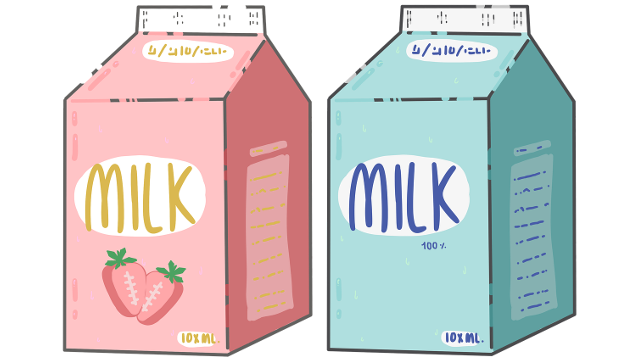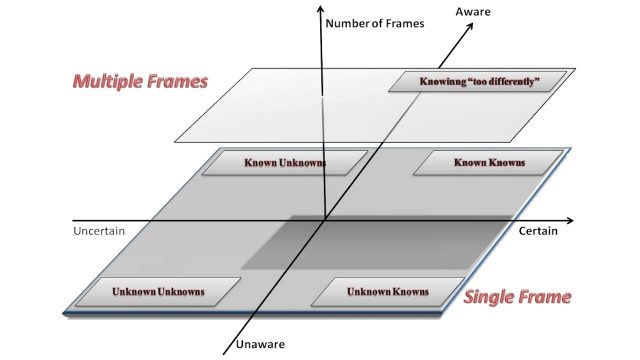
Multidisciplinary perspectives on unknown unknowns
By Gabriele Bammer. Originally published on the Integration and Implementation Insights blog.
This is part of a series of occasional “synthesis blog posts” drawing together perspectives on related topics across i2Insights contributions.
How can different disciplines and practitioners enhance the ability to understand and manage unknown unknowns, also referred to as deep uncertainty?
Seventeen blog posts have addressed these issues, covering:
- how unknown unknowns can be understood
- exploiting unknown unknowns
- accepting unknown unknowns
- reducing unknown unknowns.
How unknown unknowns can be understood
It is useful to review understanding of unknown unknowns from the perspective of the individual and the system, before turning to the project level.
Starting from the perspective of the individual, Michael Smithson points out that in essence there are two kinds of unknown unknowns, those resulting from:
- false convictions, for example, thinking that a tomato is a vegetable rather than a fruit
- things that a person is unaware of.
Matthew Welsh adds insights into the dynamic nature of unknown unknowns, with context influencing what a person remembers and forgets, including what they forget they know at any given point in time (making it an unknown unknown).
At the level of systems and system behaviours, their complexity, unpredictability and dynamic nature mean that there are many things that cannot be known, as highlighted by Antonie Jetter and Jan Kwakkel.
In between, at the project level, Tyson Browning demonstrates how individual and systems influences come together in six factors that influence the likelihood of unknown unknowns occurring:
- the complexity of the system,
- how well the people involved can understand the project,
- the system’s propensity to change,
- the adequacy of communication informing judgment and decision making,
- the ability to recognise unknown unknowns, and
- how dysfunctional the culture of the organisation is, which affects reporting of mistakes and untoward occurrences.
Exploiting unknown unknowns
Lelia Green and Bem Le Hunte, both writers, demonstrate how unknown unknowns can be used to advantage in the creative process. Lelia Green highlights the importance of “relinquishing control and being open to the unexpected” and Bem Le Hunte says “I wouldn’t be inspired to write my novels if I knew exactly what I was going to write and which ways my story would travel.” Bem Le Hunte also emphasises the importance of wonder: “Perfecting the art of wondering is a powerful way to encourage a sense of adventure around unknowns, rather than fear.”
In addition, Bem Le Hunte cites Ann Kerwin (1993), whose taxonomy of unknowns contributed to popularising the idea of unknown unknowns: “In creativity we bring life to unknown unknowns. We demonstrate that we ourselves are unknown unknowns: endowed with astounding capacities to reveal ourselves in unexpected ways. (p. 180).”
Accepting unknown unknowns
Accepting unknown unknowns as a fact of life is implicit in yin-yang thinking, as discussed by Christiane Prange and Alicia Hennig. They provide three ideas to help Westerners deal more effectively with unknown unknowns:
- “Understand that uncertainty is not something negative but can be strategically exploited, as uncertainty and certainty are two sides of the same coin that are interdependent and alternating;
- Play with both past patterns and newly emerging patterns to increase the potential scope of action;
- Practice thinking from different, opposing directions to arrive at variable and flexible solutions under the condition of constant change.”
In a similar vein, Vanesa Weyrauch describes Otto Scharmer’s Theory U and the concept of “presencing,” which “tap into the best potential of individuals, groups and organisations building on collective intelligence. When collective intelligence is activated, the prototypes that emerge from a deeper sensing and knowing are not rigid and fully known ways forward. Prototypes go through several iterations before achieving a final result.”
Michael Smithson also highlights the importance of acceptance, writing: “We are destined to sail into an unknowable future, and accepting that makes us receptive to surprises, novelty, and therefore converting unknown unknowns into known unknowns. That unknowable future is not just a source of anxiety and fear, but also the font of curiosity, hope, aspiration, adventure, and freedom.”
Improving resilience is an importance acceptance strategy as highlighted by Pedro Ferreira, who argues that it should have a larger role in planning processes.
Finally, Patricia Hirl Longstaff highlights how effective accountability requires acceptance of unknown unknowns to avoid blaming people for “problems that have emerged from underlying processes over which the person in charge has no control.” Rather than focusing on blame in such circumstances, attention needs to be paid to system adaptations to reduce the likelihood of similar problems occurring in future.
Reducing unknown unknowns
While unknown unknowns cannot be eliminated, they can be reduced. One important strategy is to increase the diversity of perspectives involved in their consideration. On an individual level, Michael Smithson suggests “Consulting others whose backgrounds are diverse and different from our own will reveal many matters and viewpoints we would otherwise be unaware of.”
Along similar lines, Rick Szostak argues that “disciplinary silos generate unknown unknowns” and posits that “cross-disciplinary scholarship is a way of identifying and mitigating unknown unknowns.”
The final five blog posts focus on reducing the impact of unknown unknowns, especially on decision making.
Scenarios, described by Laura Schmitt Olabisi, are a way of harnessing “the power of speculation and imagination, whether performed by humans or by computers … you can imagine several different possibilities, and considering that range of possibilities gives you some idea of where the future could go, helping you to structure your decisions accordingly.”
Susan van ‘t Klooster and Marjolijn Haasnoot describe two potentially complementary strategies for early detection of unknown unknowns arising from non-linear change. Both identify the seeds of such change either by monitoring system indicators that could be early warnings or by looking for low probability but high impact wild card events outside the system.
Another way of opening-up thinking about the possibility of unknown unknowns is proposed by Fabio Boschetti, who makes a case for asking: “What would change my mind? What evidence, novel insight or alternative framing would lead me to reconsider my conclusion?”
Finally, both info-gap theory and vulnerability analysis improve decision making by focusing on outcomes and putting aside the need to recognise or understand unknown unknowns. Yakov Ben Haim (info-gap theory) argues for making decisions based on identifying “outcomes or consequences that are essential (that must be achieved) and then to choose the alternative that will achieve these outcomes over the widest possible range of potential realizations.” Joseph Guillaume (vulnerability analysis), in contrast, starts from identifying outcomes to be avoided, working backwards to look for vulnerabilities that could lead to such outcomes and managing “the system to mitigate or adapt to vulnerable conditions.”
Conclusion
Even though the number of contributions described here is relatively small, nevertheless they demonstrate the power of bringing together different perspectives to improve understanding of difficult topics such as unknown unknowns. Do you have additional ideas to add? Could any of the suggestions above help you better navigate unknown unknowns?
Fourteen of the cited blog posts contributed to a series on unknown unknowns as part of a collaboration between the Australian National University and Defence Science and Technology.
Reference:
Kerwin, A. (1993). None too solid: medical ignorance. Science Communication, 15, 2: 166-85.
Blog posts cited:
Ben-Haim, Y. (2019). Managing innovation dilemmas: Info-gap theory. Integration and Implementation Insights, October 8. (Online): https://i2insights.org/2019/10/08/info-gap-theory/
Boschetti, F. (2020). Considering uncertainty, awareness and ambiguity as a three-dimensional space. Integration and Implementation Insights, July 28. (Online): https://i2insights.org/2020/07/28/uncertainty-awareness-ambiguity/
Browning, T. R. (2019). Looking in the right places to identify “unknown unknowns” in projects. Integration and Implementation Insights, November 5. (Online): https://i2insights.org/2019/11/05/detecting-unknown-unknowns-in-projects/
Ferreira, P. (2020). How can resilience benefit from planning? Integration and Implementation Insights, January 28. (Online): https://i2insights.org/2020/01/28/planning-for-resilience/
Green, L. (2019). Creative writing as a journey into the unknown unknown. Integration and Implementation Insights, October 22. (Online): https://i2insights.org/2019/10/22/creative-writing-and-unknown-unknowns/
Guillaume, J. (2019). Blackboxing unknown unknowns through vulnerability analysis. Integration and Implementation Insights, November 19. (Online): https://i2insights.org/2019/11/19/vulnerability-analysis/
Jetter, A. (2016). Uncertainty in participatory modeling – What can we learn from management research? Integration and Implementation Insights, November 10. (Online): https://i2insights.org/2016/11/10/uncertainty-in-participatory-modeling/
Kwakkel, J. (2017). Managing deep uncertainty: Exploratory modeling, adaptive plans and joint sense making. Integration and Implementation Insights, August 15. (Online): https://i2insights.org/2017/08/15/managing-deep-uncertainty/
Le Hunte, B. (2020). Why do we protect ourselves from unknown unknowns? Integration and Implementation Insights, February 11. (Online): https://i2insights.org/2020/02/11/unknown-unknowns-and-creativity/
Longstaff, P. H. (2019). Accountability and adapting to surprises. Integration and Implementation Insights, August 27. (Online): https://i2insights.org/2019/08/27/accountability-and-surprises/
Prange, C. and Hennig, A. (2019). Yin-yang thinking – A solution to dealing with unknown unknowns? Integration and Implementation Insights, December 3. (Online): https://i2insights.org/2019/12/03/yin-yang-thinking-and-unknown-unknowns/
Schmitt Olabisi, L. (2017). Dealing with deep uncertainty: Scenarios. Integration and Implementation Insights, January 5. (Online): https://i2insights.org/2017/01/05/deep-uncertainty-and-scenarios/
Smithson, M. (2019). How can we know unknown unknowns? Integration and Implementation Insights, September 10. (Online): https://i2insights.org/2019/09/10/how-can-we-know-unknown-unknowns/
Szostak, R. (2021). Can examining cross-disciplinary interactions illuminate unknown unknowns? Integration and Implementation Insights, January 5. (Online): https://i2insights.org/2021/01/05/cross-disciplinarity-illuminates-unknown-unknowns/
van ‘t Klooster, S. and Haasnoot, M. (2020). Detecting non-linear change ‘inside-the-system’ and ‘out-of-the-blue’. Integration and Implementation Insights, January 14. (Online): https://i2insights.org/2020/01/14/detecting-non-linear-change/
Welsh, M. (2019). What do you know? And how is it relevant to unknown unknowns? Integration and Implementation Insights, September 24. (Online): https://i2insights.org/2019/09/24/knowledge-and-unknown-unknowns/
Weyrauch, V. (2020). Theory U: A promising journey to embracing unknown unknowns. Integration and Implementation Insights, February 25. (Online): https://i2insights.org/2020/02/25/theory-u-and-unknown-unknowns/
Biography:
 |
Gabriele Bammer PhD is Professor of Integration and Implementation Sciences (i2S) at the National Centre for Epidemiology and Population Health at The Australian National University in Canberra. i2S provides theory and methods for tackling complex societal and environmental problems, especially for synthesis of disciplinary and stakeholder knowledge, understanding and managing diverse unknowns, and providing integrated research support for policy and practice change. |
Article source: Multidisciplinary perspectives on unknown unknowns. Republished by permission.





